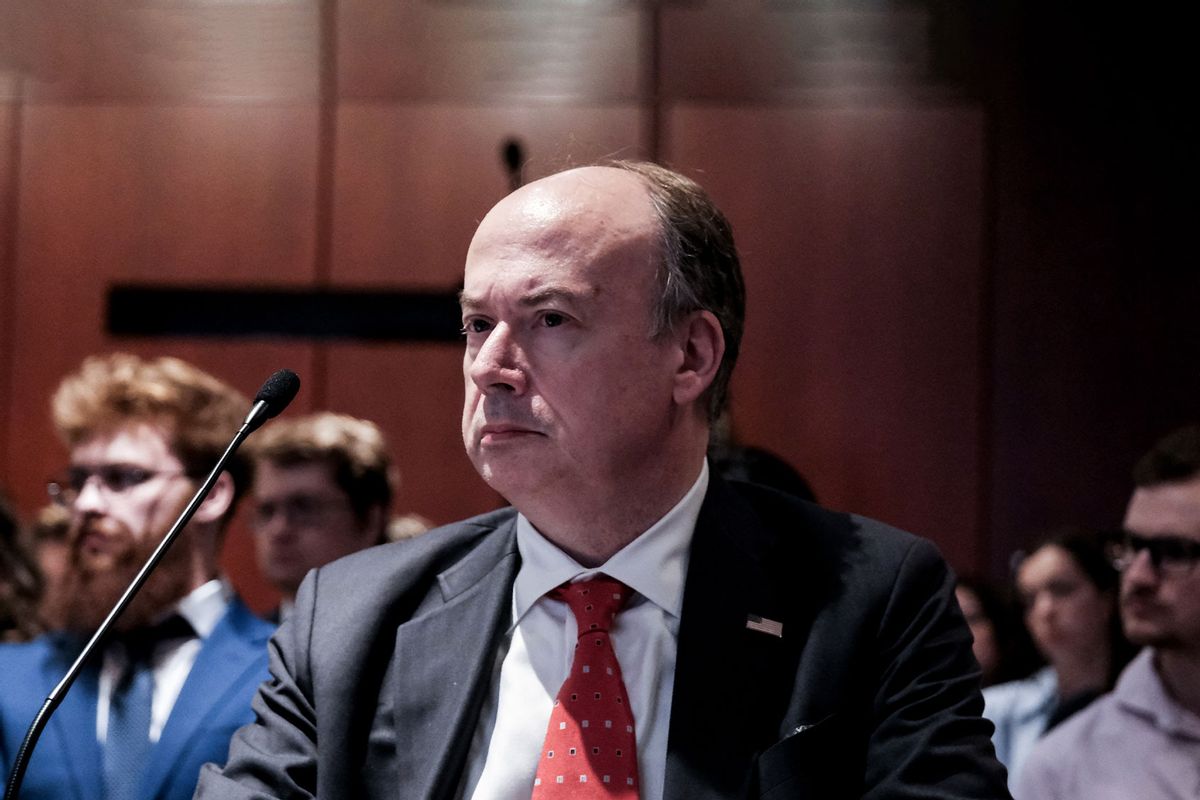“Conspiracy s**t beamed down from the mothership”: DOJ says Trumper wanted to use “Insurrection Act”

Former Justice Department official Jeffrey Clark, identified as “Co-Conspirator 4” in former President Donald Trump’s latest 45-page indictment, was prepared to quash any anti-Trump protests that would arise if he had remained in office following his 2020 electoral defeat, the indictment alleges.
Three days before the Capitol attack by a pro-Trump mob, then-deputy White House counsel Patrick Philbin attempted to dissuade Clark, then the acting assistant attorney general for the civil division, from accepting the role of acting attorney general. Philbin argued that if Trump remained in office despite his loss, there would be “riots in every major city in the United States.”
“Well, [Deputy White House Counsel], that’s why there’s an Insurrection Act,” Clark responded, according to the charging document, referring to the act that empowers the sitting president to employ state militias and armed forces to enforce federal authority and suppress civil rebellion or insurrections as he considers necessary.
The revelation, New York Magazine reports, is one of several shocking details outlined in the special counsel’s indictment of Trump, who was charged Tuesday evening with conspiracy to defraud the United States, conspiracy to obstruct an official proceeding, obstruction of and attempt to obstruct an official proceeding, and conspiracy against rights in connection to his efforts to overturn the 2020 election results.
The indictment also described how then-Vice President Mike Pence’s chief of staff was worried that Trump was putting his vice president at risk of physical harm as he continued to pressure Pence to overturn the election results from Arizona, Michigan, Wisconsin and Pennsylvania during his certifying duties at the Capitol.
Trump had repeatedly attempted to goad the vice president into the alleged conspiracy to remain in power following his 2020 electoral defeat, and had even done so during phone calls on Christmas and New Year’s Day. According to the document, Pence repeatedly rejected Trump’s efforts and told the former president that he had no legal power to change the outcome of the election. In one instance, Trump allegedly told Pence, “You’re too honest,” in response.
The set of exchanges potentially indicates that Trump knew he was lying about widespread election fraud as he pressured Pence to reject electoral votes for President Joe Biden. Pence had also taken what the special counsel referred to as “contemporaneous notes” about his interactions with Trump and his allies, which the indictment explicitly referenced twice.
In one instance said to be detailed in Pence’s notes — a Jan. 4, 2021, meeting with Trump and his attorney John Eastman, who has been identified as “co-conspirator 2” in the charging document — Pence questioned the lawyer’s proposal to return the election results to the states. Eastman told Pence that “nobody’s tested it before.”
“Did you hear that?” the then-vice president said to Trump. “Even your own counsel is not saying I have that authority.”
After Pence refused Trump’s request on the morning of Jan. 6, 2021, to return Biden’s legitimate electoral votes again, the former president reinserted false claims about Pence’s authority to send electoral votes to the states into his speech for the Stop the Steal rally on the Ellipse ahead of the Capitol attack. Hours later, Trump singled Pence out again on Twitter, claiming that the vice president “didn’t have the courage” to overturn the election as his supporters rioted in Washington, D.C. and threatened to hang Pence.
Trump’s team continued to pressure Pence even after the Capitol insurrection, according to the charging document, with Eastman attempting to get Pence to delay the election certification in a last-ditch effort via email.
“I implore you to consider one more relatively minor violation [of the ECA] and adjourn for 10 days to allow the legislatures to finish their investigations, as well as to allow a full forensic audit of the massive amount of illegal activity that has occurred here,” Eastman wrote in an email to Pence late in the night on Jan. 6.
Want a daily wrap-up of all the news and commentary Salon has to offer? Subscribe to our morning newsletter, Crash Course.
Rudy Giuliani, who is clearly identifiable as “Co-Conspirator 1” in the indictment, also pressured a senator after the Capitol attack to slow down the certification. According to the indictment, Giuliani left a voicemail for the unnamed U.S. senator that said: “We need you, our Republican friends, to try to just slow it down so we can get these legislatures to get more information to you. And I know they’re reconvening at eight tonight but the only strategy we can follow is to object to numerous states and raise issues so that we get ourselves into tomorrow—ideally until the end of tomorrow.”
The special counsel accused Trump of peddling election fraud claims he knew were false for months, noting that the former president was informed by multiple parties — including White House lawyers, his campaign, the Justice Department and the intelligence community — that his claims had no merit.
The Trump campaign’s efforts to contest the election results in Georgia, Arizona, Pennsylvania and Michigan even took center stage in the indictment with the special counsel describing the frustration Trump’s Georgia team felt with the lack of evidence Trump and Giuliani were providing as they received constant assurance from state officials that there was no election fraud.
“When our research and campaign legal team cant back up any of the claims made by our Elite Strike Force Legal Team, you can see why we’re 0-32 on our case,” the campaign advisor then wrote in an email. “I’ll obviously hustle to help on all fronts, but it’s tough to own any of this when it’s all just conspiracy shit beamed down from the mothership.”
Read more
about the Trump indictment

